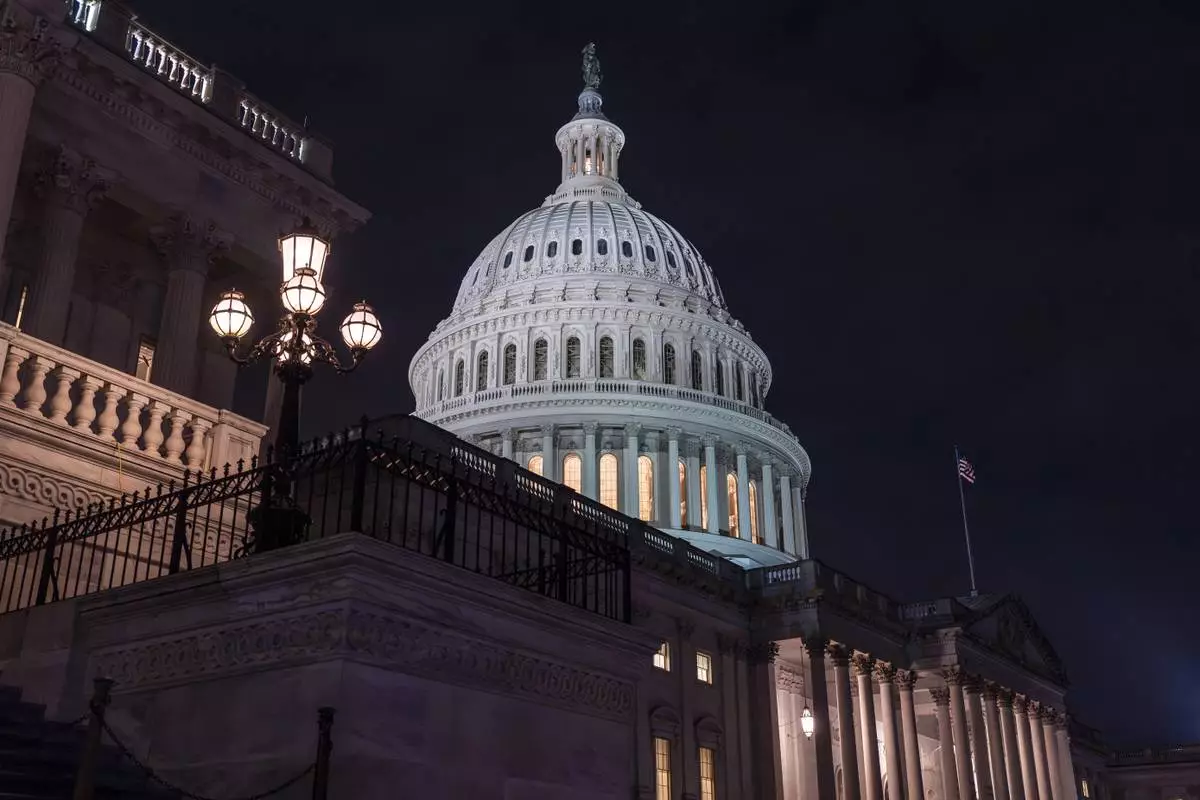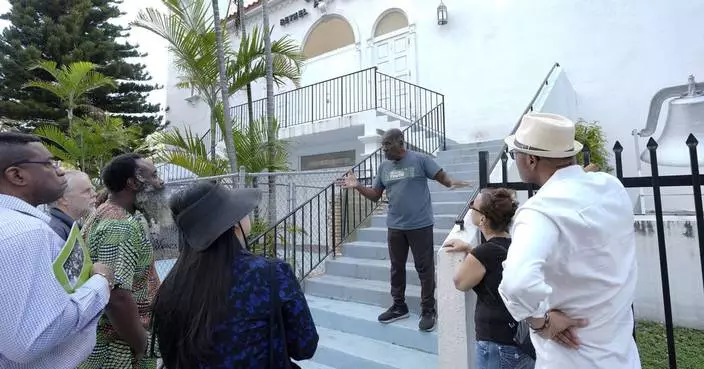KIGALI, Rwanda (AP) — Rwandan health authorities will begin a vaccine study against the Marburg hemorrhagic fever, officials said Sunday, as the East African country tries to stop the spread of an outbreak that has killed 12 people.
Rwanda, which received 700 doses of a vaccine under trial from the U.S.-based Sabin Vaccine Institute on Saturday, will target health workers and emergency responders as well as individuals who have been in contact with confirmed cases, according to the Health Ministry.
Health Minister Sabin Nsanzimana told reporters Sunday that the Rwanda Biomedical Centre had reviewed the vaccine shipment.
There is no authorized vaccine or treatment for Marburg.
Like Ebola, the Marburg virus is believed to originate in fruit bats and spreads between people through close contact with the bodily fluids of infected individuals or with surfaces, such as contaminated bed sheets. Without treatment, Marburg can be fatal in up to 88% of people who fall ill with the disease.
In a statement, Sabin Vaccine Institute said it had “entered into a clinical trial agreement with the Rwanda Biomedical Centre, the trial sponsor, to provide investigational doses" for the study.
The Rwandan government said there were 46 confirmed cases, with 29 of them in isolation. Health authorities have identified at least 400 people who came into contact with confirmed cases of the virus.
Rwanda declared an outbreak of Marburg on Sept. 27 and reported six deaths a day later. Authorities said at the time that the first cases had been found among patients in health facilities. There is still no confirmation of the source of the outbreak.
Symptoms include fever, muscle pains, diarrhea, vomiting and, in some cases, death through extreme blood loss.
In Rwanda, most of the sick are health workers in six out of the country's 30 districts. Some patients live in districts bordering Congo, Burundi, Uganda and Tanzania, according to the World Health Organization.
Rwandans have been urged to avoid physical contact to help curb the spread. Strict measures include the suspension of school and hospital visits as well as a restriction on the number of those who can attend funerals for Marburg victims. Home vigils aren’t allowed in the event a death is linked to Marburg.
The U.S. Embassy in Kigali has urged its staff to work remotely and avoid visiting offices.
Marburg outbreaks and individual cases have in the past been recorded in Tanzania, Equatorial Guinea, Angola, Congo, Kenya, South Africa, Uganda and Ghana, according to WHO.
The virus was first identified in 1967, after it caused simultaneous outbreaks of disease in laboratories in Marburg, Germany and Belgrade, Serbia. Seven people died after being exposed to the virus while conducting research on monkeys.

Rwanda will deploy Marburg vaccine under trial as death toll rises to 12

FILE - In this Oct. 8, 2014 photo, a medical worker from the Infection Prevention and Control unit wearing full protective equipment carries a meal to an isolation tent housing a man being quarantined after coming into contact in Uganda with a carrier of the Marburg Virus, at the Kenyatta National Hospital in Nairobi, Kenya. (AP Photo/Ben Curtis, File)

Rwanda will deploy Marburg vaccine under trial as death toll rises to 12
WASHINGTON (AP) — The Senate passed legislation early Saturday to boost Social Security payments for millions of people, pushing a longtime priority for former public employees through Congress in one of its last acts for the year.
The bipartisan bill, which next heads to President Joe Biden, will eliminate longtime reductions to Social Security benefits for nearly 3 million people who receive pensions from work in federal, state and local government, or public service jobs like teachers, firefighters and police officers. Advocates say the Social Security Fairness Act rights a decades-old disparity, though it will also put further strain on Social Security Trust Funds.
The legislation has been decades in the making but the push to pass it came together in the final weeks — and was completed in the final minutes — that lawmakers were in Washington before Congress resets next year. All Senate Democrats, as well as 27 Republicans, voted for the bill, giving it a final tally of 76-20.
“Millions of retired teachers and firefighters and letter carriers and state and local workers have waited decades for this moment. No longer will public retirees see their hard-earned Social Security benefits robbed from them,” said Senate Majority Leader Chuck Schumer, D-N.Y.
The bill repeals two provisions — the Windfall Elimination Provision and the Government Pension Offset — that limit Social Security benefits for certain recipients if they receive retirement payments from other sources such as the public retirement program for a state or local government.
“Social Security is a bedrock of our middle class. It’s retirement security that Americans pay into and earn over a lifetime," said Sen. Sherrod Brown, an Ohio Democrat who has pushed for the proposal for years and will leave Congress after losing reelection.
He added that the current restrictions make “no sense. These workers serve the public. They protect our communities. They teach our kids. They pay into Social Security just like everyone else."
People who currently have reductions in their Social Security benefits under the exceptions would soon see a boost in their monthly payments. But those increased payments would also add an estimated $195 billion to federal deficits over 10 years, according to the Congressional Budget Office.
Social Security Trust Funds were already estimated to be unable to pay out full benefits beginning in 2035, and the change will hasten the program’s insolvency date by about half a year. A typical dual-income couple retiring in 2033 would see an additional $25,000 lifetime reduction in their benefits, according to the nonpartisan Committee for a Responsible Federal Budget.
Many of the bill's opponents acknowledged that the current reductions are not fair to public service retirees, but said they could not support the bill when the entire program faces challenges.
“We caved to the pressure of the moment instead of doing this on a sustainable basis,” said Sen. Thom Tillis, a North Carolina Republican who opposed the bill.
The policy changes will also heap more work on the Social Security Administration when the agency is already at its lowest staffing level in 50 years. The agency currently has a staff of about 56,400 — the lowest level since 1972, according to an agency spokesperson — even as it serves more people than ever. The stopgap government funding bill that also passed early Saturday did not include increased funding for the agency, which is currently in a hiring freeze.
Still, Republican supporters of the bill said there was a rare opportunity to address what they described as an unfair section of federal law that hurts public service retirees.
“They have earned these benefits. This is an unfair, inequitable penalty,” said Sen. Susan Collins, a Maine Republican.
GOP supporters of the bill also said they would return to work on larger fixes to Social Security. President-elect Donald Trump, however, has said he will not touch the benefits, even as his administration looks to make deep budget cuts elsewhere.
Senate Republicans are nonetheless working on ideas that would put the program on better financial footing, but also inevitably require a scale-back in benefits. One fiscal hawk, Sen. Rand Paul, pushed Friday for a proposal to gradually raise the Social Security retirement age to 70, although a vote to add that provision to the bill only received three votes in favor of it.
“There's so much riding on us getting this right and having the courage to fix Social Security over the next few years,” Tillis said. “We will rue the day that we failed to do it.”

The Capitol is pictured in Washington, Friday, Dec. 20, 2024. (AP Photo/J. Scott Applewhite)













